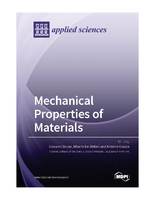Dublin Core
Title
Mechanical Properties of Materials
Subject
Medicine, dentistry, prosthodontic
Description
In the oral environment, restorative and prosthetic aterials and appliances are exposed to chemical, thermal and mechanical challenges. The mechanical properties of a material define how it responds to the application of a physical force. The mechanical properties which are of importance in dentistry include brittleness, compressive strength, ductility, elastic modulus, fatigue limit, flexural
modulus, flexural strength, fracture toughness, hardness, impact strength, malleability, Poisson’s ratio, shear modulus, shear and tensile strength, torsional strength and Young’s modulus. All of these are measures of the resistance of materials to deformation, crack or fracture under an applied force or pressure. Measured responses can be both elastic (reversible on force removal) and plastic
(irreversible on force removal). Recent advances in nanotechnology and 3D printing have rapidly spread and manufacturers continuously develop new materials and solutions to provide high-quality dental care, with particular attention being paid to long-term follow-up. Restorative dentistry, prosthodontics, oral surgery, implants, periodontology and orthodontics are all involved in this continuing evolution. This Special Issue focuses on all the recent technology that can enhance the mechanical properties of materials used in all of the different branches of dentistry.
modulus, flexural strength, fracture toughness, hardness, impact strength, malleability, Poisson’s ratio, shear modulus, shear and tensile strength, torsional strength and Young’s modulus. All of these are measures of the resistance of materials to deformation, crack or fracture under an applied force or pressure. Measured responses can be both elastic (reversible on force removal) and plastic
(irreversible on force removal). Recent advances in nanotechnology and 3D printing have rapidly spread and manufacturers continuously develop new materials and solutions to provide high-quality dental care, with particular attention being paid to long-term follow-up. Restorative dentistry, prosthodontics, oral surgery, implants, periodontology and orthodontics are all involved in this continuing evolution. This Special Issue focuses on all the recent technology that can enhance the mechanical properties of materials used in all of the different branches of dentistry.
Creator
Giovanni Bruno
Alberto De Stefani
Alberto De Stefani
Source
https://www.mdpi.com/books/pdfview/book/4258
Publisher
www.mdpi.com/books
Date
August 2021
Contributor
Dwi prihastuti, S.Sos
Rights
https://creativecommons.org/licenses/by/4.0/
Format
pdf
Language
English
Type
Textbooks
Identifier
https://doi.org/10.3390/books978-3-0365-1085-9
ISBN 978-3-0365-1085-9 (PDF)

